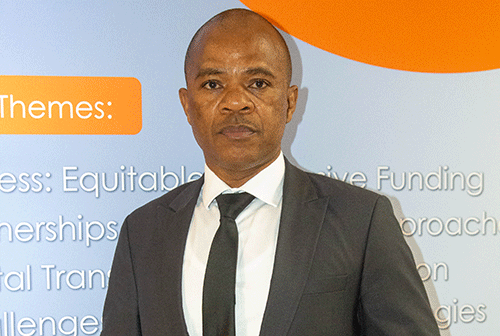SWAKOPMUND – Increased funding to the Namibia Students Financial Assistance Fund (NSFAF) has resulted in close to 5 000 more students being assisted financially with their studies this year.
NSFAF acting chief executive officer Kennedy Kandume said the fund received N$2.1 billion for 2023, up from N$1.58 billion in 2022.
This, he said, has resulted in a 30% increase from 17 232 Namibian students who benefited in 2022 to 22 176 students being funded this financial year.
Kandume revealed this during a presentation at the African Higher Education Financing Agencies International Conference in Swakopmund, which was attended by representatives from more than 14 countries last week.
NSFAF earlier this year indicated that the institution had a N$400 million funding shortfall from the required N$2 billion budget, as it only received N$1.6 billion for the fiscal year 2023, which can only accommodate half of its new awardees.
“This increased funding is a significant contribution by the government to supporting access to higher education and the success of students from poor and working-class backgrounds,” said Kandume.
He said with such a massive injection, NSFAF is now working on designing a new funding model which might get approval before the end of the year.
“It will handle the issue of 100% tuition fees and non-tuition fees, as well as the discussion on whether student loan repayment interest rates should be tied to the inflation rate,” he said.
Over the past decade, NSFAF has awarded bursaries to over 160 000 Namibian students, with loans between 2019 and 2022 often in the N$1.5 billion range annually, impacting 50 000 students in total.
“This year, we have seen the impact of such a windfall on student beneficiaries. In addition, we have also seen the success of our debt recovery efforts since we went on a campaign between July 2022 and July 2023,” said Kandume.
He said the institution’s debt recovery improved from an annual collection of N$4 million to N$15.1 million in 2023.
“Bear in mind that the amnesty campaign was instituted by President Hage Geingob in light of the Covid-19 pandemic, and we can safely inform the nation that our recovery efforts have paid off,” said Kandume.
The four-day gathering of researchers, academics, policymakers, innovators, students, and financing agencies sought to reshape higher education financing in Africa and attracted over 100 high-level delegates from Africa, Europe, Asia, and South America.
During the gathering, NSFAF demonstrated to other African countries how its improved operational efficiency was aiding effectiveness, including the introduction of monthly payments for non-tuition fees, where beneficiaries receive their money on the same day as the NSFAF staff payroll system.
Dr Itah Kandjii-Murangi, Minister of Higher Education, Training, and Innovation, confirmed the government’s position: “Government answered to the demand for student funding that increased due to the impact of Covid-19. As a government, it is our duty to make sure that all those with potential are not left out due to the lack of funds, and we will continue to find innovative ways to improve the lives of our people, ensuring that no one is left out.”
Meanwhile, the Association of African Higher Education Financing Agencies (AAHEFA) president Charles Ringera, during the fourth annual AAHEFA meeting, indicated that Africa is a continent of immense potential, rich in culture, diversity, and talent.
Yet, one of the significant challenges facing the continent is the accessibility and affordability of higher education, he said.
– edeklerk@nepc.com.na
Caption:



